Can Cockatiels Eat Kiwi? An In-Depth Analysis
Kiwis are extremely nutrient-dense fruits for Cockatiels that contain very high amounts of vitamin C, vitamin E, fiber, and an array of healthy minerals.
Wondering, can cockatiels eat kiwi? Yes, they can definitely eat kiwi, and they enjoy eating them a lot! Kiwis are not only good for their health but also for enlightening their moods. However, it should only be served in small amounts and not too frequently.
It is very important to know how much kiwi are and how often to serve them to your cockatiel. We will also discuss the benefits of giving your bird kiwi and the ways to prepare them. So keep on reading!
Can Cockatiels Eat Kiwi?
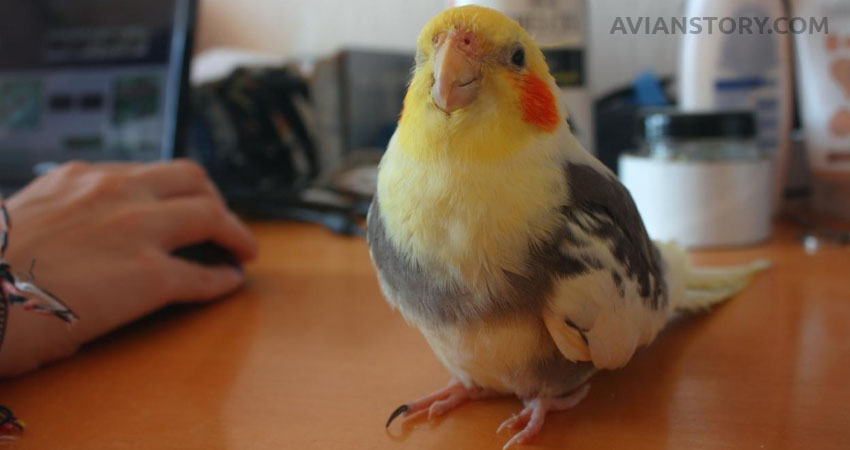
To answer simply, Cockatiels can consume kiwi. It contains a rich amount of vitamin C, vitamin E, and fiber, all of which are very beneficial to the bird. However, it is important to know what part of the fruit is not needed or is undigestable for your pet bird.
While preparing the fruit, you might wonder, can cockatiels eat kiwi seeds? Although kiwi seeds do not have anything poisonous or anything harmful to the bird, it is tough for them to digest. Therefore, it is always recommended to remove the seeds of the fruit before you give it to them.
It is okay to feed your cockatiel kiwi regularly, but the amount you feed them each time should be monitored. Kiwis are very rich in sugar content; thus, they should be served in small amounts.
It is a very good idea to provide your pet cockatiel bird with tasty snacks from time to time. Not only is kiwi extremely healthy for them, improving their physical health, but it also is the perfect thing to enlighten their mood, improving their mental health.
Health Benefits Provided By Kiwi
There are tons of health benefits that can be taken advantage of by feeding your cockatiel kiwi. Such as:
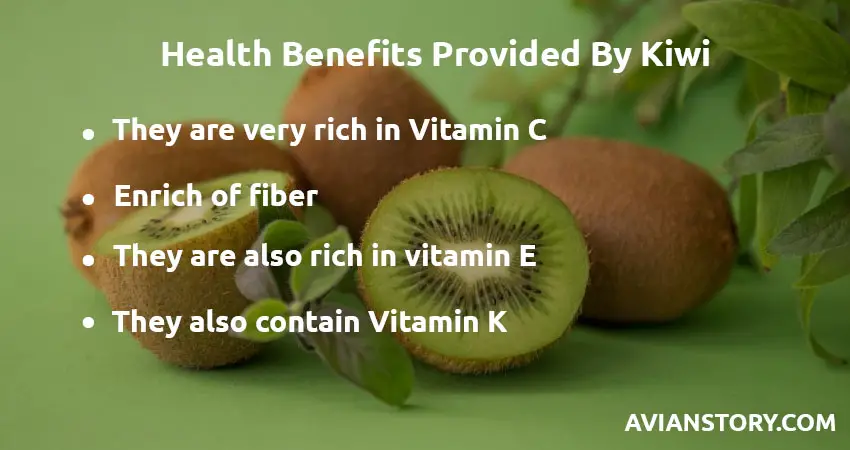
1. They are very rich in Vitamin C
Vitamin C is a strong antioxidant. This can prevent oxidative damage to your cockatiel’s cells.
2. Enrich of fiber
Fibre is a crucial compoment to your cockatails diet. It helps with healthy digestion so that your bird can be comfortable after eating.
3. They are also rich in vitamin E
This is a much-needed vitamin for the bird’s immune system to work properly so that it can prevent illnesses. The vitamin also aids in maintaining the skin and eye health.
4. They also contain Vitamin K
Your pet cockatiel will require vitamin K to produce healthy bone tissue.
Kiwis also contain a good amount of minerals. Ranging from copper, folate, and potassium to magnesium, all of these are very good for the bird.
How Much And How Often Should You Give Your Cocktiels Kiwi?
Kiwis are an extremely nutrient-dense food, thus you should not give your little pet bird a big serving of it each time you feed it kiwi. Cockatiels are small birds, which has a relatively small diet.
Due to kiwis’ high nutrient density, consumption in large amounts can lead to your cockatiel feeling sick or can cause problems in digestion. It is recommended to give your cockatiel kiwi every 2-3 days a week. Furthermore, the recommended portion size is half a kiwi.
You should especially portion the kiwi to the correct amount when first introducing your bird to the fruit. Due to it being very tasty, cockatiels can easily overfeed and become sick.
Can Cockatiels Eat Kiwi Skin?
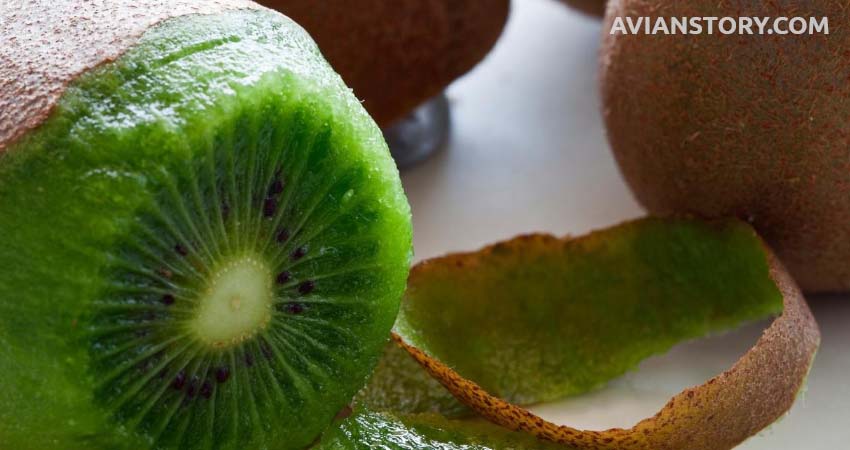
It is often not a good idea to give your cocktail kiwi skin. Even though it is not harmful or poisonous to the bird by any means. It just does not contain the fiber that the bird will utilize. It can even cause problems in digestion.
Despite the skin being actually more nutrient dense than the flesh of some fruits, it is certainly not the case for kiwis. Thus, removing the skin and serving the flesh only is a good idea.
However, if you’ve provided your cockatiel kiwi with the skin on, and they seem to eat and enjoy the skin, you can still offer it to them.
How Should You Prepare Kiwi For Your Cockatiels?
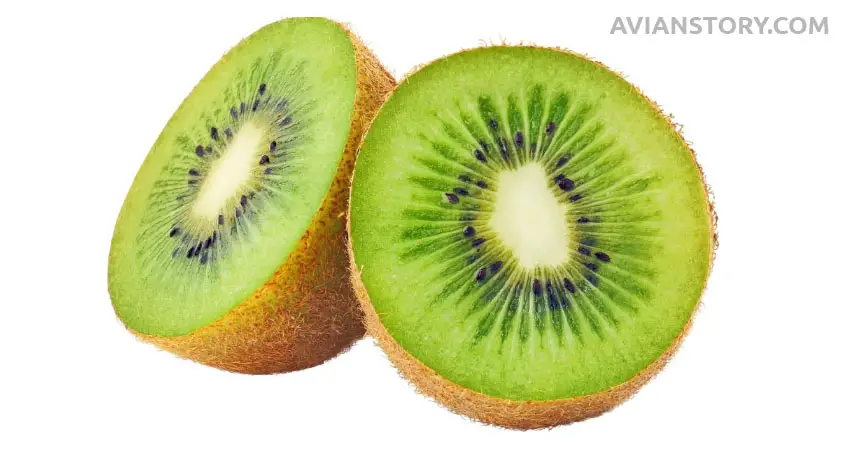
You can first just slice the kiwi in half and give it to your cockatiel. If you see your cockatiel having no problems eating like this and avoiding the skin and the seeds by themselves, then there’s no need to further prepare the kiwi.
However, if it’s not the case, then you can try cutting the kiwi in half and removing the seeds.
You can also try mashing the kiwi and mixing it with bird food or water. Blending it up is also not a bad idea to feed kiwi to your bird.
Why Should You Give Your Cockatiel Fresh Fruit, Such As A Kiwi?
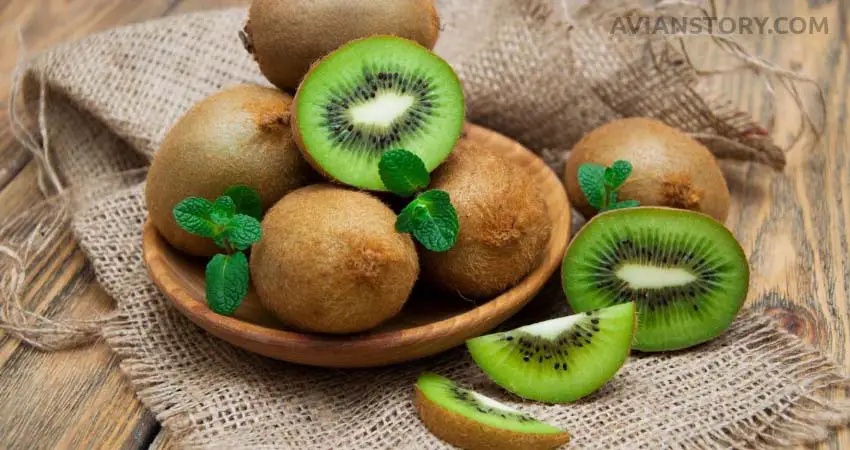
Cockatiels require 20% of their regular diet to be fresh fruits and greens to stay healthy. They should be regularly provided with fresh fruits and greens that they would naturally have if they were in the wild.
In addition to the numerous benefits described earlier, providing fresh fruits as snacks now and then will surely keep them happy and fulfill all of their requirements for minerals and vitamins.
FAQs
After learning everything there is to know about cockatiels and kiwis, let’s look at some frequently asked questions. It will undoubtedly answer some more queries you might have.
Can Cockatiels Eat Fuzzy Kiwis?
It is a very common variety of kiwi, and yes, it is completely safe for cockatiels to eat fuzzy kiwis.
Can You Feed Baby Cockatiels Kiwis?
Yes, and it is often a great source of nutrients for them. You should slice the kiwi into very small pieces or just blend it into a drink before serving it so that the baby bird can eat it easily.
Can Kiwis Have A Behavioral Effect On My Cockatiel?
It can affect its behavior considering the high sugar content kiwis have. However, it is absolutely nothing to worry about when feeding your bird the right amount of kiwi.
Outro
So, can cockatiels eat kiwi? Undoubtedly, kiwis are great for cockatiels. And if you’re not giving it to them already, you should definitely add it to your bird’s diet. It is full of vitamins and minerals which are extremely beneficial for your cockatiels health.
However, the only thing that you should be keeping in mind is the portion size which often is nothing more than half a slice. And, it is ideal to serve them every 2-3 days. Serving them more often might lead to health problems, or they might just get bored of it. With that being said, I hope you’ll be able to look after your bird’s diet. But do not neglect yours either!
